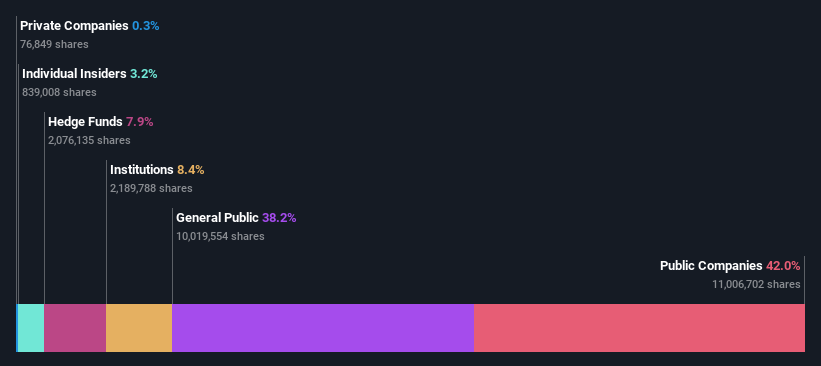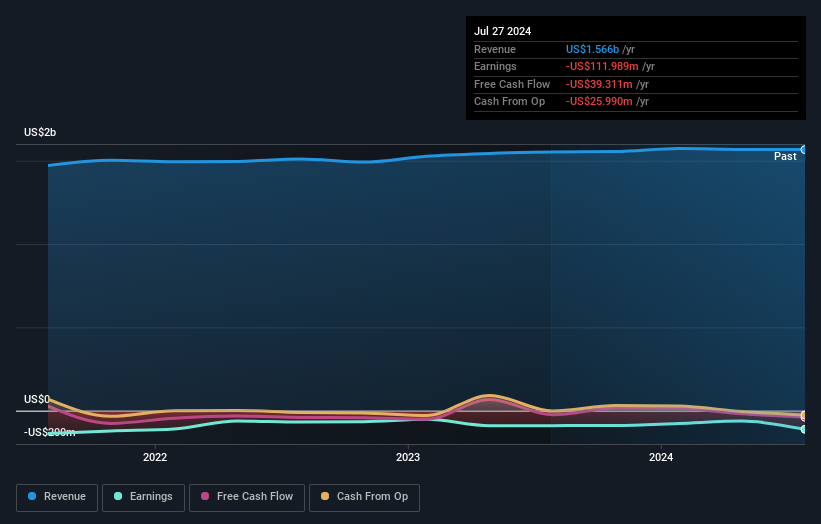- United States
- /
- Specialty Stores
- /
- NYSE:BNED
Barnes & Noble Education, Inc.'s (NYSE:BNED) market cap surged US$94m last week, public companies who have a lot riding on the company were rewarded

Key Insights
- Significant control over Barnes & Noble Education by public companies implies that the general public has more power to influence management and governance-related decisions
- The top 3 shareholders own 56% of the company
- Using data from company's past performance alongside ownership research, one can better assess the future performance of a company
If you want to know who really controls Barnes & Noble Education, Inc. (NYSE:BNED), then you'll have to look at the makeup of its share registry. And the group that holds the biggest piece of the pie are public companies with 42% ownership. In other words, the group stands to gain the most (or lose the most) from their investment into the company.
Clearly, public companies benefitted the most after the company's market cap rose by US$94m last week.
Let's take a closer look to see what the different types of shareholders can tell us about Barnes & Noble Education.
See our latest analysis for Barnes & Noble Education

What Does The Institutional Ownership Tell Us About Barnes & Noble Education?
Institutional investors commonly compare their own returns to the returns of a commonly followed index. So they generally do consider buying larger companies that are included in the relevant benchmark index.
As you can see, institutional investors have a fair amount of stake in Barnes & Noble Education. This implies the analysts working for those institutions have looked at the stock and they like it. But just like anyone else, they could be wrong. It is not uncommon to see a big share price drop if two large institutional investors try to sell out of a stock at the same time. So it is worth checking the past earnings trajectory of Barnes & Noble Education, (below). Of course, keep in mind that there are other factors to consider, too.

Our data indicates that hedge funds own 7.9% of Barnes & Noble Education. That's interesting, because hedge funds can be quite active and activist. Many look for medium term catalysts that will drive the share price higher. Our data shows that Immersion Corporation is the largest shareholder with 42% of shares outstanding. In comparison, the second and third largest shareholders hold about 7.9% and 6.0% of the stock. Furthermore, CEO Jonathan Shar is the owner of 1.4% of the company's shares.
To make our study more interesting, we found that the top 3 shareholders have a majority ownership in the company, meaning that they are powerful enough to influence the decisions of the company.
While it makes sense to study institutional ownership data for a company, it also makes sense to study analyst sentiments to know which way the wind is blowing. Our information suggests that there isn't any analyst coverage of the stock, so it is probably little known.
Insider Ownership Of Barnes & Noble Education
The definition of an insider can differ slightly between different countries, but members of the board of directors always count. Management ultimately answers to the board. However, it is not uncommon for managers to be executive board members, especially if they are a founder or the CEO.
Most consider insider ownership a positive because it can indicate the board is well aligned with other shareholders. However, on some occasions too much power is concentrated within this group.
We can report that insiders do own shares in Barnes & Noble Education, Inc.. In their own names, insiders own US$11m worth of stock in the US$331m company. It is good to see some investment by insiders, but it might be worth checking if those insiders have been buying.
General Public Ownership
With a 38% ownership, the general public, mostly comprising of individual investors, have some degree of sway over Barnes & Noble Education. While this size of ownership may not be enough to sway a policy decision in their favour, they can still make a collective impact on company policies.
Public Company Ownership
Public companies currently own 42% of Barnes & Noble Education stock. We can't be certain but it is quite possible this is a strategic stake. The businesses may be similar, or work together.
Next Steps:
I find it very interesting to look at who exactly owns a company. But to truly gain insight, we need to consider other information, too. For example, we've discovered 3 warning signs for Barnes & Noble Education (2 are potentially serious!) that you should be aware of before investing here.
Of course, you might find a fantastic investment by looking elsewhere. So take a peek at this free list of interesting companies.
NB: Figures in this article are calculated using data from the last twelve months, which refer to the 12-month period ending on the last date of the month the financial statement is dated. This may not be consistent with full year annual report figures.
If you're looking to trade Barnes & Noble Education, open an account with the lowest-cost platform trusted by professionals, Interactive Brokers.
With clients in over 200 countries and territories, and access to 160 markets, IBKR lets you trade stocks, options, futures, forex, bonds and funds from a single integrated account.
Enjoy no hidden fees, no account minimums, and FX conversion rates as low as 0.03%, far better than what most brokers offer.
Sponsored ContentValuation is complex, but we're here to simplify it.
Discover if Barnes & Noble Education might be undervalued or overvalued with our detailed analysis, featuring fair value estimates, potential risks, dividends, insider trades, and its financial condition.
Access Free AnalysisHave feedback on this article? Concerned about the content? Get in touch with us directly. Alternatively, email editorial-team (at) simplywallst.com.
This article by Simply Wall St is general in nature. We provide commentary based on historical data and analyst forecasts only using an unbiased methodology and our articles are not intended to be financial advice. It does not constitute a recommendation to buy or sell any stock, and does not take account of your objectives, or your financial situation. We aim to bring you long-term focused analysis driven by fundamental data. Note that our analysis may not factor in the latest price-sensitive company announcements or qualitative material. Simply Wall St has no position in any stocks mentioned.
About NYSE:BNED
Barnes & Noble Education
Operates bookstores for college and university campuses, and K-12 institutions primarily in the United States.
Low and slightly overvalued.
Similar Companies
Market Insights
Community Narratives





